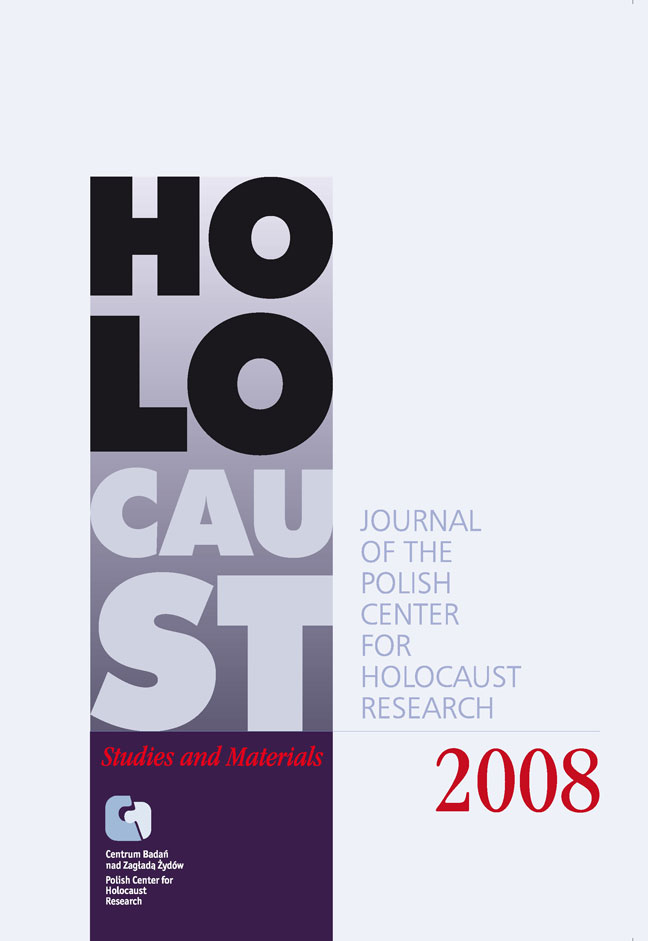Apocrypha from the History of the Jewish Military Union and its Authors
Zagłada Żydów. Studia i Materiały, 2008, Pages: 147-176
Submission Date: 2020-10-03Publication Date: 2008-12-01
 https://doi.org/10.32927/ZZSiM.79
https://doi.org/10.32927/ZZSiM.79
Abstract
This article is an attempt at a critical analysis of the history of the Jewish Fighting Union (JFU) and a presentation of their authors based on documents kept in the archives of the Institute of National Remembrance in Warsaw. The author believes that an uncritical approach and such a treatment of these materials, which were generated under the communist regime and used for political purposes resulted in a perverted and lasting picture of the history of this fighting organisation of Zionists-revisionists both in Poland and Israel. The author has focused on a deconstruction of the most important and best known “testimonies regarding the Warsaw Ghetto Uprising”, the development and JFU participation in this struggle, given by Henryk Iwański, Władysław Zajdler, Tadeusz Bednarczyk and Janusz Ketling–Szemley.
A comparative analysis of these materials, supplemented by important details of their war-time and postwar biographies, leaves no doubt as to the fact that they should not be analysed in terms of their historical credibility and leads one to conclude that a profound revision of research approach to JFU history is necessary.
A comparative analysis of these materials, supplemented by important details of their war-time and postwar biographies, leaves no doubt as to the fact that they should not be analysed in terms of their historical credibility and leads one to conclude that a profound revision of research approach to JFU history is necessary.
Keywords
Holocaust , Jewish Fighting Union , Security Corps , Warsaw Ghetto Uprising , source critique
License
Copyright (c) 2008 Author&"Holocaust Studies and Materials"

This work is licensed under a Creative Commons Attribution 4.0 International License.
https://creativecommons.org/licenses/by/4.0
The journal is published under the Diamond Open Access Standard, CC-BY-4.0 Deed - Attribution 4.0 International - Creative Commons
Most read articles by the same author(s)
- Dariusz Libionka, Polish Literature on Organized and Individual Help to the Jews (1945–2008) , Zagłada Żydów. Studia i Materiały: 2010: Holocaust Studies and Materials
- Dariusz Libionka, Jacek Leociak, 75th Anniversary of Operation Reinhardt , Zagłada Żydów. Studia i Materiały: No. 13 (2017)
- Dariusz Libionka, Polish Church Hierarchy and the Holocaust – an Essay from a Critical Perspective , Zagłada Żydów. Studia i Materiały: 2010: Holocaust Studies and Materials
- Dariusz Libionka, Polish Church Hierarchy and the Holocaust – A Critical Essay , Zagłada Żydów. Studia i Materiały: No. 5 (2009)
- Dariusz Libionka, Jan Grabowski, The Anatomy of the Incriminating Letter Regarding Father Tadeusz Puder Sent by Father Stanisław Trzeciak , Zagłada Żydów. Studia i Materiały: No. 13 (2017)
- Dariusz Libionka, Alina Skibińska, “I swear to fight for a free and mighty Poland, carry out the orders of my superiors, so help me God.”Jews in the Home Army. An Episode from Ostrowiec Świętokrzyski , Zagłada Żydów. Studia i Materiały: 2008: Holocaust Studies and Materials
- Adam Kopciowski, Dariusz Libionka, Testimony of Poale Zion Left activist Pola Elster regarding the situation at the Umschlagplatz and in the transport to Poniatowa in April 1943 , Zagłada Żydów. Studia i Materiały: No. 19 (2023)
- Jan Grabowski, Dariusz Libionka, Historical Policy Gone Astray. What the Ulma Family Museum of Poles Saving Jews in World War II Fails to Discuss , Zagłada Żydów. Studia i Materiały: No. 12 (2016)
- Jan Grabowski, Dariusz Libionka, Reports on the Jews Apprehended in Warsaw During May–July 1943 Submitted by the ‘Praga’ District of the Polish Police , Zagłada Żydów. Studia i Materiały: No. Holocaust Studies and Materials (2017)
- Dariusz Libionka, Underground Poland’s Attitude Towards Blackmailers and Szmalcowniks in Warsaw. A Picture Corrected , Zagłada Żydów. Studia i Materiały: No. 14 (2018)
Similar Articles
- Gabriel Finder, The Trial of Shepsl Rotholc and the Politics of Retribution in the Aftermath of the Holocaust , Zagłada Żydów. Studia i Materiały: No. 2 (2006)
- Gabriel Finder, Bernard Mark, the Uprising in the Warsaw Ghetto, and Jürgen Stroop’s Trial , Zagłada Żydów. Studia i Materiały: No. 13 (2017)
- Jacek Leociak, Understanding the Holocaust. A Task for Generations , Zagłada Żydów. Studia i Materiały: 2008: Holocaust Studies and Materials
- Jacek Leociak, Anniversaries of the Warsaw Ghetto Uprising in public discourse (with special reference to the years 1943–1944, 1968 and 2023) , Zagłada Żydów. Studia i Materiały: No. 19 (2023)
- Dan Michman, Dutch Society and the Jewish Fate: A Puzzling Record , Zagłada Żydów. Studia i Materiały: No. 12 (2016)
- Dariusz Libionka, Apocrypha from the History of the Jewish Military Union and its Authors , Zagłada Żydów. Studia i Materiały: No. 1 (2005)
- Karolina Panz, The Destruction of shtetl Grice , Zagłada Żydów. Studia i Materiały: No. 3 (2007)
- Sharon Geva, Underground fighters, mothers and daughters. Jewish women in the Warsaw Ghetto during the uprising (April–May 1943) , Zagłada Żydów. Studia i Materiały: No. 19 (2023)
- Havi Dreifuss, Jewish Fighting Organization command during the Warsaw ghetto uprising – a new interpretation , Zagłada Żydów. Studia i Materiały: No. 19 (2023)
- Anka Grupińska, Dariusz Libionka, Interview with Józef Grynblatt, member of the Betar and the Jewish Military Union (ŻZW) during the Warsaw Ghetto Uprising , Zagłada Żydów. Studia i Materiały: No. 3 (2007)
1 2 3 4 5 6 7 8 9 10 11 12 13 14 15 16 17 18 19 20 21 22 23 24 25 26 27 28 29 30 31 32 33 34 35 36 37 38 39 40 41 42 43 44 45 46 47 48 49 50 > >>
You may also start an advanced similarity search for this article.
 English
English
 Język Polski
Język Polski



 https://orcid.org/0000-0003-0180-6463
https://orcid.org/0000-0003-0180-6463





